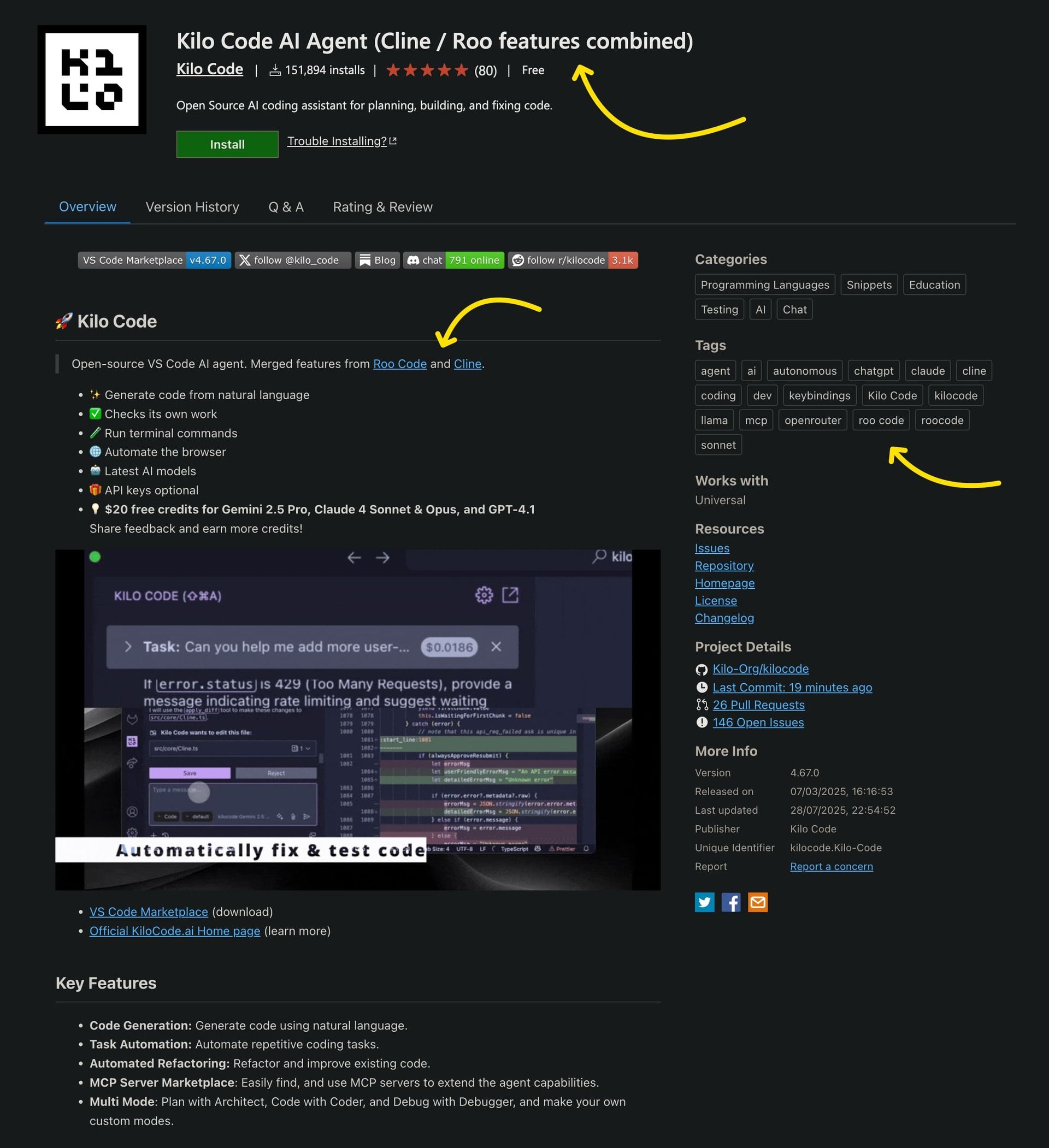- Startup Spells 🪄
- Posts
- How Kilo Code's Naming Hack Hijacked Search Results From Popular Competitors
How Kilo Code's Naming Hack Hijacked Search Results From Popular Competitors
PLUS: GPT Agent Mode is going to Change the World...
How Kilo Code's Naming Hack Hijacked Search Results From Popular Competitors
Kilo Code found a clever way to compete with giants. Instead of fighting for attention with a generic name, they put their competitors' names right in their title: "Kilo Code AI Agent (Cline / Roo features combined)".

Kilo Code AI Agent (Cline / Roo features combined) - VSCode Extension
Here's what they're up against:
Compared to Cline and Roo Code, Kilo Code has only 151,894 installs (80 reviews)
How One Extension Stole Traffic From Two Million-Install Competitors
When developers search for "Cline" or "Roo Code," guess what shows up? Kilo Code's extension appears in the results because those exact keywords are in the title and tags.
It's not made by the original creators—it's a fork that combines features from both extensions.
This simple naming trick lets Kilo Code capture searches meant for much bigger competitors.
Keyword-Stuffed Names Actually Dominate VS Code Marketplace Rankings
The VS Code marketplace ranking works like this: install counts and reviews matter most. New extensions struggle to rank for popular keywords because established ones dominate.
But there's a hack. A blog post from Sixth (an AI code assistant) revealed their breakthrough strategy. They changed their extension name from a short brand name "Sixty" to a keyword-packed title: "ChatGPT GPT-4, AI Code Assistant, Code Generation, Code Chat, Code Completion, Autocomplete, Realtime Code Scanner, and Code Search for Javascript, Python, Typescript, PHP, Go, Java, C#, C++, R, Rust, HT."
This "clunky" name dramatically boosted visibility and installs because the marketplace algorithm favors keywords in extension names. Once they gained enough installs and reviews, they switched back to a shorter name while keeping their ranking.
Kilo Code follows this exact playbook. By including "Cline / Roo features combined" in their title and tags, they target searches for those popular extensions.
This strategy isn't new. Other companies have used similar tactics.
Musical.ly's (now TikTok) App Store Domination
Alex Zhu, co-founder of Musical.ly (now TikTok), revealed their early growth hack in a 2016 interview. Apple's App Store heavily weighted application names in search results, so they exploited this with an extremely long name packed with popular search phrases.
They included phrases like "make awesome music videos... for Instagram, for Facebook Messenger." This long name made the app rank for searches about music videos and specific social platforms, driving organic downloads.
Podcast SEO Success Story
Two growth marketers launched a podcast called "In Growth We Trust: Marketing | Growth | Startups". By targeting keywords like "startups," "growth," and "marketing" in the title, the podcast earned top placement on Spotify and even outranked YCombinator at times.
The underlying principle is simple: platform search algorithms favor keywords in titles. When you put descriptive, searchable terms in your name, you influence discovery and rankings.
For Kilo Code, this means capturing even a small fraction of users searching for Cline (1.96 million installs) or Roo Code (702k installs) can significantly boost their install count. More installs lead to better rankings, creating a growth cycle.
The strategy works because:
Keywords in names boost discoverability for new extensions
Once you gain installs and reviews, you maintain ranking even with shorter names
Platform algorithms prioritize title keywords over other fields
Kilo Code's naming strategy shows how smart positioning can help smaller players compete with established giants. By combining competitor names with their value proposition, they've turned search algorithms into a growth engine.
Top Tweets of the day
1/
the churn rate @chatbase has been consistently going down since day 1.
we had 27 % churn in the first month, which meant we were almost replacing all customers every < 4 months.
what actually worked was just 100 % focus on the product. anything else for churn is a waste
— Yasser (@yasser_elsaid_)
2:15 PM • Jul 28, 2025
Linear is one product made by developers who understand UI/UX and it shows. Love their zero bug policy idea.
2/
Guys I hate to rain on this parade but json prompting isn’t better. This post doesn’t even try to provide evidence that it’s better, it’s just hype.
It physically pains me that this is getting so much traction
- I’ve actually done experiments on this and markdown or xml is
— Noah MacCallum (@noahmacca)
6:44 PM • Jul 27, 2025
This guy wrote the OpenAI Prompting Guide. Markdown or XML is better. I've heard YAML is even better than XML but XML is much more readable and more popular so most tools have tooling around only XML support like RepoPrompt.
3/
7 out of the 10 most valuable private companies are AI companies
— Lisan al Gaib (@scaling01)
9:01 PM • Jul 28, 2025
You can call that 8 out of 10. AI is a must in every company now. Not using it in your work means working slowly. Soon, everyone from garbage man and video editors to doctors and lawyers will be using AI to do their jobs.
Rabbit Holes
GPT Agent Mode is going to Change the World... by Julian Reeves
You need to hire a Vibe Marketer by Nikunj Kothari
Agents are not just about coding by /r/ClaudeAI
What’d ya think of today’s newsletter? Hit ‘reply’ and let me know.
Do me a favor and share it in your company's Slack #marketing channel.
First time? Subscribe.
Follow me on X.
More Startup Spells 🪄
How Anthropic's $200/month MAX Subscription Becomes a Steal by Making Opus API Pricing Expensive (LINK)
How Beehiiv's Honeybee 🐝 Emoji took over X (LINK)
How Social Growth Engineers Uses X Funnels to Grow an Email List and Promote Shortimize SaaS (LINK)
How Lucidchart Turned Memes into Millions of Views (LINK)
Reply